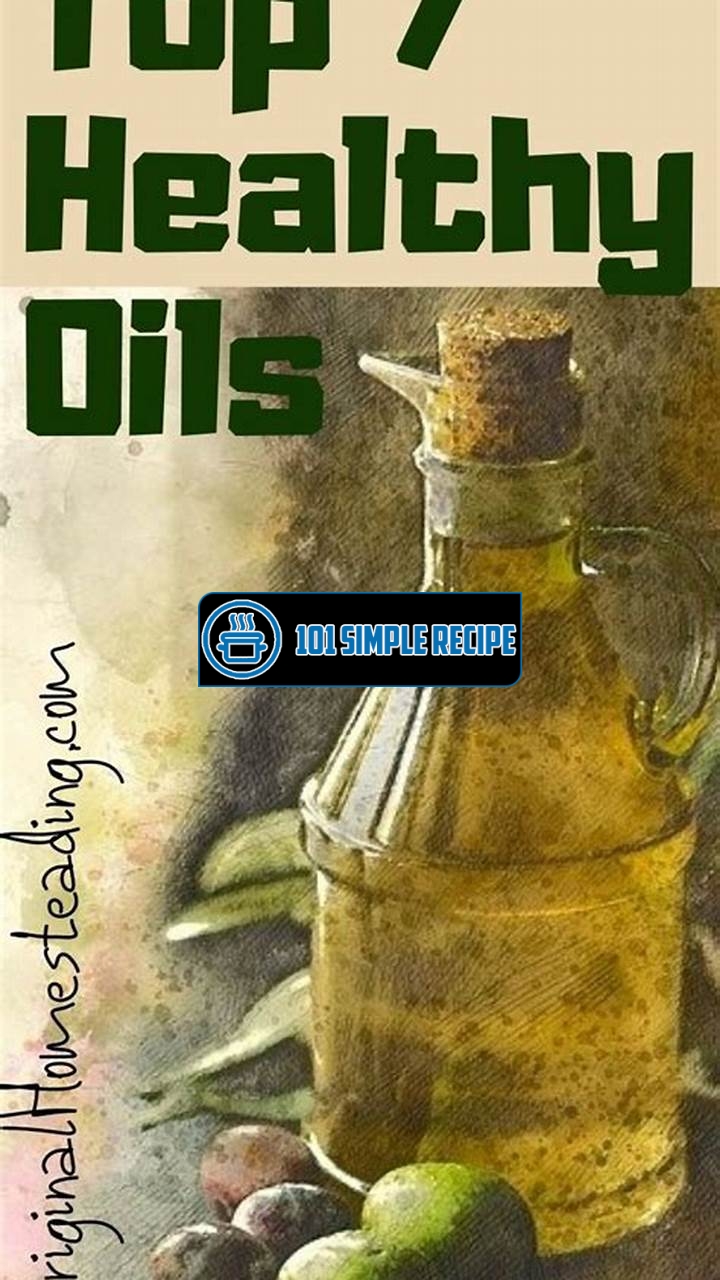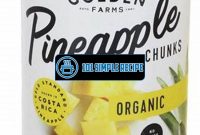Are you looking for the perfect healthy oil to use in your baking recipes? Look no further! In this article, we will unveil the best oil that will bring out the natural flavors in your baked goods while offering health benefits. But before we reveal the secret, it’s important to understand why choosing the right oil is essential. The oil you use can greatly impact the taste, texture, and overall nutritional value of your baked treats. So, let’s dive in and discover the ultimate oil for your baking needs!

Understanding Different Types of Oils
When it comes to baking, choosing the right oil is crucial to ensure the best results. There are various types of oils commonly used in baking, each with its own unique benefits. In this article, we will explore the different types of oils and the advantages they offer.
Nut and Seed Oils
Nut and seed oils, such as almond oil, walnut oil, and flaxseed oil, are excellent options for baking. These oils are derived from nuts and seeds, and they bring a rich, nutty flavor to baked goods. They also contain essential fatty acids, vitamins, and minerals, making them a healthier choice compared to some other oils.
One of the benefits of using nut and seed oils in baking is their high smoke point. This means they can withstand higher temperatures without breaking down or producing harmful compounds. Additionally, these oils add moisture to baked goods, resulting in a soft and tender texture.
When incorporating nut and seed oils into your baking recipes, it’s important to consider their individual flavors. For example, almond oil has a subtle almond taste that pairs well with cookies and cakes. On the other hand, walnut oil has a stronger flavor, which can complement recipes that include chocolate or savory ingredients. Experiment with different nut and seed oils to find the perfect match for your desired flavor profile!
Vegetable Oils
Vegetable oils, such as canola oil, sunflower oil, and soybean oil, are commonly used in baking due to their neutral flavor and versatility. These oils are extracted from various plant sources and offer a range of benefits for baking purposes.
One of the advantages of vegetable oils is their high smoke point, similar to nut and seed oils. This makes them suitable for baking at higher temperatures without worrying about the oil breaking down or imparting unwanted flavors. They also contribute to the moistness and tenderness of baked goods.
Canola oil, in particular, is a popular choice for baking. It has a mild flavor and a light texture, making it ideal for producing tender cakes, moist breads, and flaky pastries. Sunflower oil, on the other hand, adds a slightly nutty taste to baked goods and is often used in recipes that require a richer flavor.
Olive Oil
Olive oil is another healthy oil option that can be used in baking. It is made from pressing olives, resulting in an oil that is rich in monounsaturated fats, antioxidants, and vitamins. Olive oil is known for its distinct flavor and can bring a delicious Mediterranean touch to your baked goods.
When using olive oil in baking, it’s important to choose the right type for the recipe. Extra virgin olive oil has the most pronounced flavor and is perfect for recipes that can benefit from its fruity and peppery notes. On the other hand, light or mild olive oil has a more subtle taste, making it suitable for recipes where you don’t want the olive oil flavor to overpower other ingredients.
Keep in mind that olive oil has a lower smoke point compared to nut and seed oils and vegetable oils. Therefore, it is best suited for baking at lower temperatures. This makes it a great choice for breads, muffins, and quick breads that don’t require high heat.
In conclusion, choosing the right oil for baking is essential to achieve the desired flavor, texture, and health benefits. Nut and seed oils, vegetable oils, and olive oil all offer their own distinct advantages. Consider the flavor profile of each oil and experiment with different types to find the perfect option for your baking needs. Enjoy the process of baking and the delicious results that come with using the best healthy oil for baking!
Criteria for Selecting Healthy Oils
When it comes to baking, choosing the right oil is crucial for both the taste and health of your baked goods. With so many options available, it can be overwhelming to determine which oil is the best for baking. To help you make an informed decision, here are the key factors to consider when selecting a healthy oil for baking.
Smoke Point
The smoke point of an oil is the temperature at which it begins to smoke and break down, leading to the release of harmful compounds and a burnt taste in your baked goods. It’s important to choose an oil with a high smoke point to ensure that it can withstand the heat of baking without compromising its quality.
Tip: Oils with high smoke points include avocado oil, refined coconut oil, and grapeseed oil.
Nutritional Profile
Consider the nutritional profile of the oil you choose. Look for oils that are low in saturated fats and trans fats, as these fats can contribute to heart disease and other health issues. Instead, opt for oils that are high in monounsaturated fats and polyunsaturated fats, which can help promote heart health.
Remember: Olive oil, canola oil, and sunflower oil are good options with a healthier fat profile.
Getting more detailed:
– Olive oil: Extra virgin olive oil is rich in antioxidants and heart-healthy monounsaturated fats. It adds a distinctive flavor to your baked goods.
– Canola oil: Canola oil is low in saturated fat and has a neutral flavor, making it a versatile option for baking.
– Sunflower oil: Sunflower oil is high in vitamin E and has a mild taste, making it suitable for a wide range of baked goods.
Taste and Aroma
The taste and aroma of the oil can greatly impact the final flavor of your baked goods. Some oils have a strong flavor that may overpower or clash with certain ingredients, while others have a more neutral taste that can enhance the flavors of your baked goods without stealing the show.
Pro tip: Use oils with a mild flavor, such as avocado oil or light olive oil, for baking recipes that require delicate flavors.
✨ Bonus note: Experiment with different oils to find the perfect balance of taste and aroma for your favorite baked goods!
In conclusion, when selecting a healthy oil for baking, consider factors such as smoke point, nutritional profile, taste, and aroma. Oils with high smoke points like avocado oil, refined coconut oil, and grapeseed oil are great options. Look for oils with a healthy fat profile such as olive oil, canola oil, and sunflower oil. Lastly, choose oils with a mild flavor like avocado oil or light olive oil for delicate baked goods. By following these guidelines, you’ll be able to choose the best healthy oil for your baking needs.
When it comes to baking, using the best healthy oil for baking is essential for both taste and nutrition. One of the top choices for this purpose is olive oil. Olive oil adds a rich and delicate flavor to baked goods and also provides numerous health benefits. It is high in monounsaturated fats which are heart-healthy and can help reduce inflammation. Additionally, olive oil contains antioxidants that protect cells from damage and promote overall well-being. When using olive oil for baking, opt for extra virgin olive oil for the best flavor and quality.
Top Healthy Oils for Baking
When it comes to baking, using the right oil can make a significant difference in the taste, texture, and overall healthiness of your baked goods. In this article, we will explore three of the best oils for baking that not only offer health benefits but also provide excellent results in your favorite baked treats.
Coconut Oil
Coconut oil has gained popularity in recent years for its numerous health benefits and versatility in the kitchen. This oil is extracted from the meat of mature coconuts and is known for its rich flavor and aroma. When it comes to baking, coconut oil can be a great choice due to its high smoke point and ability to withstand high temperatures without breaking down.
Moreover, coconut oil contains medium-chain triglycerides (MCTs), which are easily digestible and provide a quick source of energy. These MCTs have been linked to various health benefits, including improved brain function and weight loss.
Additionally, coconut oil can add moisture and richness to your baked goods, making them more flavorful and tender. Whether you’re making cookies, cakes, or bread, substituting coconut oil for butter or vegetable oil can take your baking to the next level.
Avocado Oil
Avocado oil is another excellent option for baking. Derived from the flesh of ripe avocados, this oil offers a mild, buttery flavor and a smooth texture. Avocado oil is rich in monounsaturated fats, which are considered heart-healthy fats that can help lower bad cholesterol levels and reduce the risk of heart disease.
One of the main advantages of using avocado oil in baking is its high smoke point. This means that even at high temperatures, avocado oil remains stable and retains its nutritional properties. It also has a neutral taste, allowing the flavors of your baked goods to shine through without overpowering them.
Furthermore, avocado oil is packed with vitamins and minerals, such as vitamin E and potassium, which are beneficial for your overall health. So, when you’re looking for a healthier alternative to traditional oils in your baking recipes, avocado oil is definitely worth considering.
Grapeseed Oil
Grapeseed oil is extracted from the seeds of grapes and is known for its light, neutral flavor. This oil is an excellent choice for baking because of its high smoke point, making it suitable for various baking techniques such as sautéing, frying, and roasting.
In terms of health benefits, grapeseed oil is a good source of vitamin E and antioxidants, which can help protect your cells from damage caused by free radicals. It also contains omega-6 fatty acids, which are essential for maintaining healthy skin and promoting proper brain function.
Grapeseed oil has a low saturated fat content and is cholesterol-free, making it a heart-healthy option for baking. Additionally, it has a light and delicate flavor that won’t overpower the other ingredients in your baked goods.
Overall, grapeseed oil is a versatile and healthy choice for your baking needs, allowing you to achieve outstanding results without compromising on taste or nutrition.
Now that you have discovered the top three healthy oils for baking, you can confidently start incorporating them into your favorite recipes. Whether you choose coconut oil, avocado oil, or grapeseed oil, each of these oils offers its unique benefits and can help you create delicious and wholesome baked treats. So, go ahead and experiment with these oils to elevate the health and flavor of your homemade goodies!
Health Benefits of Using Healthy Oils
When it comes to baking, choosing the right oil is crucial for both flavor and health. Using healthier oil options not only enhances the taste of your baked goods but also offers numerous health benefits that contribute to your overall well-being. Here, we delve into the specific benefits associated with baking using healthier oils, including reduced cholesterol, improved heart health, and enhanced nutrient absorption.
Reduced Cholesterol
One of the key advantages of baking with healthier oils is the promotion of reduced cholesterol levels. Regular consumption of unhealthy oils can lead to an increase in bad cholesterol (LDL) and a decrease in good cholesterol (HDL). However, opting for healthier oils can help combat this issue and maintain a healthier cholesterol profile.
By using oils with higher levels of unsaturated fats, such as olive oil or avocado oil, you can significantly lower your LDL cholesterol levels. These unsaturated fats not only help reduce bad cholesterol but also promote the increase of good cholesterol, essential for maintaining cardiovascular health.
Heart Health
Baking with healthier oils can have a positive impact on your heart health. Trans fats, commonly found in processed oils, margarine, and shortening, can increase the risk of heart disease. By utilizing healthier oil options, you can eliminate trans fats from your baking and protect your heart.
Olive oil, for example, contains polyphenols which have been linked to reduced inflammation and oxidative stress in the body. These factors play a crucial role in maintaining a healthy heart and preventing cardiovascular diseases. Additionally, avocado oil is rich in monounsaturated fats that can lower blood pressure levels, reducing the strain on your heart.
Improved Nutrient Absorption
Baking with healthier oils can also enhance nutrient absorption in your body. Certain vitamins, such as vitamin A, D, E, and K, are fat-soluble, meaning they require fat to be properly absorbed and utilized by the body. By using healthier oils in your baking, you ensure that your body effectively absorbs these essential nutrients.
Coconut oil, known for its medium-chain triglycerides (MCTs), enhances the absorption of fat-soluble vitamins, leading to improved overall nutrient absorption. Including coconut oil in your baked goods allows you to reap the full benefits of important vitamins, promoting better health and well-being.
In conclusion, baking with healthier oils offers numerous health benefits that contribute to improved cholesterol levels, enhanced heart health, and improved nutrient absorption. By making mindful choices and incorporating oils such as olive oil, avocado oil, and coconut oil into your baking, you can enjoy delicious treats while taking care of your body.
Another great option for baking is coconut oil. Coconut oil adds a subtle tropical taste to baked goods and provides a moist texture. It is rich in medium-chain fatty acids which are easily digested and converted into energy. Coconut oil also has antimicrobial properties that can support a healthy immune system. When using coconut oil for baking, choose unrefined and organic varieties for the best taste and health benefits.
Tips for Properly Using Healthy Oils in Baking
When it comes to baking, using healthy oils can be a great alternative to butter or shortening. Not only do they add moisture and flavor to your baked goods, but they also offer a range of health benefits. However, it’s important to know how to properly use these oils to ensure the best results. Here are some helpful tips and techniques for incorporating healthy oils into your baking routine.
Using Oils in Place of Butter or Shortening
One of the main benefits of using oils in baking is that they can be a healthier substitute for butter or shortening. Oils are typically lower in saturated fat and cholesterol, making them a better choice for heart health. When using oils as a replacement, it’s important to keep in mind that they have a higher moisture content. You’ll need to make some adjustments to your recipes to ensure the right consistency and texture. Here’s what you can do:
- When a recipe calls for butter, you can usually substitute it with an equal amount of oil. However, keep in mind that some oils have a stronger flavor than others, so it’s best to choose one that complements the other ingredients in your recipe.
- If a recipe calls for shortening, you can use the same amount of oil, but reduce it by around 20%. This will help maintain the structure of the baked goods without adding too much moisture.
Substitution Ratios
When it comes to substituting oils for butter or shortening, it’s important to understand the substitution ratios. Different oils have different consistencies and flavors, so the ratio may vary depending on the oil you choose. Here’s a general guide:
- If a recipe calls for 1 cup of butter, you can usually substitute it with ¾ cup of oil.
- If a recipe calls for 1 cup of shortening, you can use ¾ cup of oil, but reduce it by about 20%.
These ratios can be a good starting point, but feel free to experiment with different ratios to find the one that works best for you and your taste preferences.
Storing and Preserving Oils
Properly storing and preserving your oils is essential to maintain their quality and freshness. Here are some tips to keep in mind:
- Store your oils in a cool, dark place to prevent them from becoming rancid.
- Avoid exposing oils to heat or sunlight, as this can accelerate the oxidation process.
- Check the expiration date on the bottle and use the oil before it goes bad. Using rancid oil can affect the taste and quality of your baked goods.
By following these storage and preservation tips, you can ensure that your oils stay fresh and flavorful for longer.
In conclusion, using healthy oils in baking can be a great way to add flavor and health benefits to your favorite recipes. By properly substituting oils for butter or shortening, understanding the substitution ratios, and storing them correctly, you can achieve delicious and nutritious baked goods. So go ahead, get creative with your oils, and enjoy the benefits of healthier baking!
A popular choice for baking is avocado oil. Avocado oil is rich in monounsaturated fats, similar to olive oil, and offers a mild and buttery flavor to baked goods. It is also high in vitamin E, which is an antioxidant that helps protect against cell damage. Avocado oil is known for its high smoke point, making it ideal for baking at higher temperatures. It can be used as a substitute for butter or vegetable oil in recipes.
Frequently Asked Questions
Here are some commonly asked questions about the best healthy oil for baking:
| No. | Questions | Answers |
|---|---|---|
| 1. | What is the best oil for baking? | The best oil for baking is usually the one with a high smoke point, such as canola oil or avocado oil. These oils can withstand the high temperatures of the oven without breaking down or producing harmful chemicals. |
| 2. | Can I use olive oil for baking? | Yes, you can use olive oil for baking, but it’s best to use extra-virgin olive oil for recipes that require a mild or fruity flavor. For recipes that require a more neutral flavor, you can use regular olive oil or other oils with a higher smoke point. |
| 3. | Is coconut oil good for baking? | Yes, coconut oil is a popular choice for baking due to its unique flavor and ability to add moisture to baked goods. However, keep in mind that coconut oil has a lower smoke point, so it may not be suitable for high-temperature baking. |
| 4. | What oil can I use instead of vegetable oil for baking? | You can substitute vegetable oil with other options like canola oil, sunflower oil, or even applesauce for certain recipes. These alternatives can provide similar moisture and texture to your baked goods. |
| 5. | Can I use butter instead of oil for baking? | Yes, butter can be used in place of oil for baking but keep in mind that it will add a rich and distinct flavor to your baked goods. Ensure to adjust the quantity accordingly, as butter has a higher fat content than most oils. |
| 6. | Are there any healthy oil alternatives for baking? | Certainly! Besides the aforementioned options, alternatives like grapeseed oil, walnut oil, or even Greek yogurt can be used in baking to provide unique flavors and additional health benefits. |
Thanks for Reading and Visit Again!
We hope you found this article on the best healthy oil for baking informative and helpful. Choosing the right oil for your baking needs is essential for achieving delicious and nutritious results. Whether you opt for canola oil, avocado oil, or any other oil, remember to consider the smoke point, flavor, and health benefits. Experiment with different oils to find your favorite and don’t be afraid to try the various alternatives. We’ll be back soon with more exciting and informative articles. Until then, happy baking!
Jump to Recipe
Best Healthy Oil for Baking

Discover the best healthy oil options for baking and create delicious treats!
- 2 cups all-purpose flour
- 1 cup sugar
- 1/2 cup canola oil
- 2 large eggs
- 1 tsp vanilla extract
- 1 tsp baking powder
- 1/2 tsp baking soda
- 1/2 tsp salt
- 1 cup buttermilk
- Preheat the oven to 350°F (175°C). Grease and flour a 9×13-inch baking dish.
- In a large mixing bowl, whisk together the flour, sugar, baking powder, baking soda, and salt.
- In a separate bowl, beat together the oil, eggs, vanilla extract, and buttermilk.
- Slowly add the wet ingredients to the dry ingredients, stirring until just combined.
- Pour the batter into the prepared baking dish and bake for 25-30 minutes, or until a toothpick inserted into the center comes out clean.
- Allow the cake to cool before serving. Enjoy!






